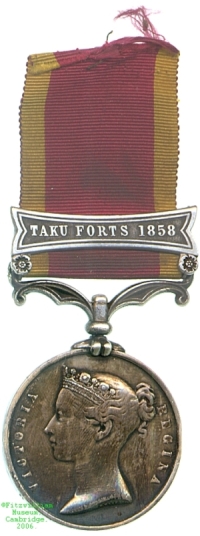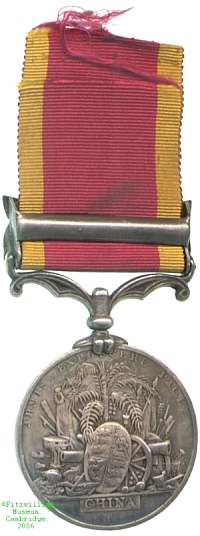
Obverse, a bust of Queen Victoria

Reverse, a collection of war trophies including a royal shield below palm tree

Obverse, a bust of Queen Victoria |

Reverse, a collection of war trophies including a royal shield below palm tree |
Increasing competition from the USA and France for Chinese trade concessions, against a background of extreme Chinese reluctance to co-operate with British trading interests after the First Opium War, led Britain to demand new trading concessions of China in 1854 to secure its `most favoured nation' status. China rejected this demand, and resentment on the ground eventually came to a boil with the seizure by Chinese authorities of a Hong Kong steamer, the Arrow, which the British claimed as a breach of their rights. In retaliation British forces seized the fort of Guangzhou (Canton), with help from US naval vessels, but were driven out of the city when its people and soldiery ignored their governor's order not to resist. Reinforcements for the British were soon sent from India, although slowly because of the concurrent First War of Indian Independence (usually known as the Indian Mutiny).
Similar tensions and incidents led to France joining Britain in the war, and coalition forces once massed took Guangzhou in 1857, exiling the governor, Ye Mingshen, to India where he died of self-imposed starvation. An initial treaty was settled between France, Russia, the USA and Britain at Tientsin in 1858, although the Taku Forts that guard the entry to the Hai He River had had to be captured to permit this. The Chinese authority of the Chinese signatory to the Treaty was disputable, and when China refused to honour the Treaty's terms further fighting ensued.
The recipient of this medal, Private William Smith of the 31st Regiment, was involved in the 1858 capture of the Taku Forts which permitted the advance to Tientsin. His medal was purchased by Lester Watson at some point before 1928.